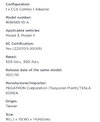GBMaryland
Member
I moved out of New Jersey for a reason.They are mostly along main routes - the Turnpike has a few, Route 1 in North Brunswick (10 minutes from me), etc. Which makes sense because these are mainly for road trips, and you would not need to stop more than once in NJ. Which is your loss.
I shutter to think what New Jersey’s going to do when gasoline becomes less prominent and electric cars become more prominent. ($.20 a kilowatt hour in taxes?)
Add to that things like a “moving out of state tax” when you sell your home and don’t move to someplace else in New Jersey…. Not to mention the absurd gun laws that make even Californians cry…
I’m happy to have moved out of New Jersey. I’m still confused that there aren’t lots of car chargers in many of the small towns. When you compare it to places like Massachusetts or Maryland, or other places, it’s just sort of weird.



